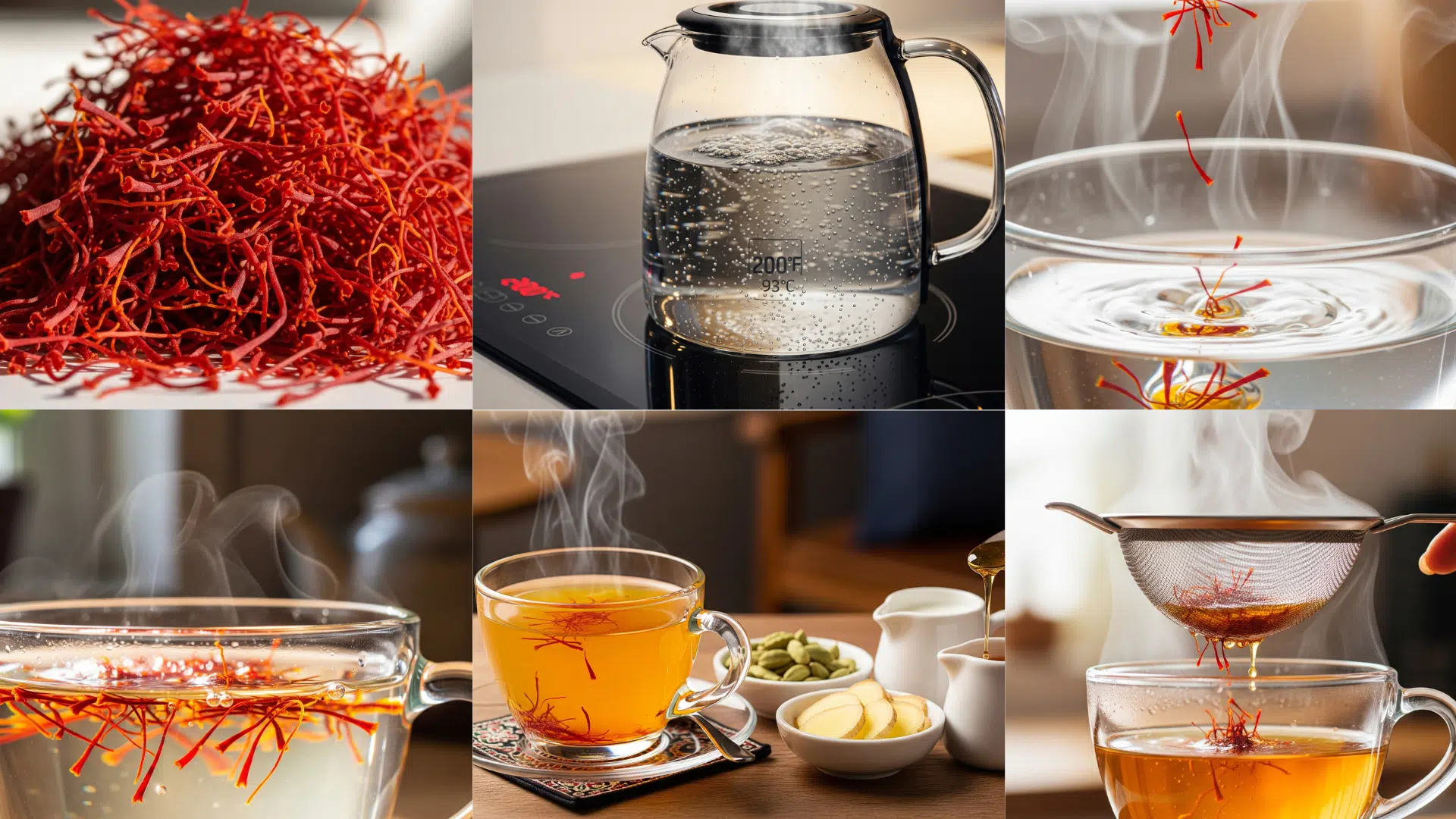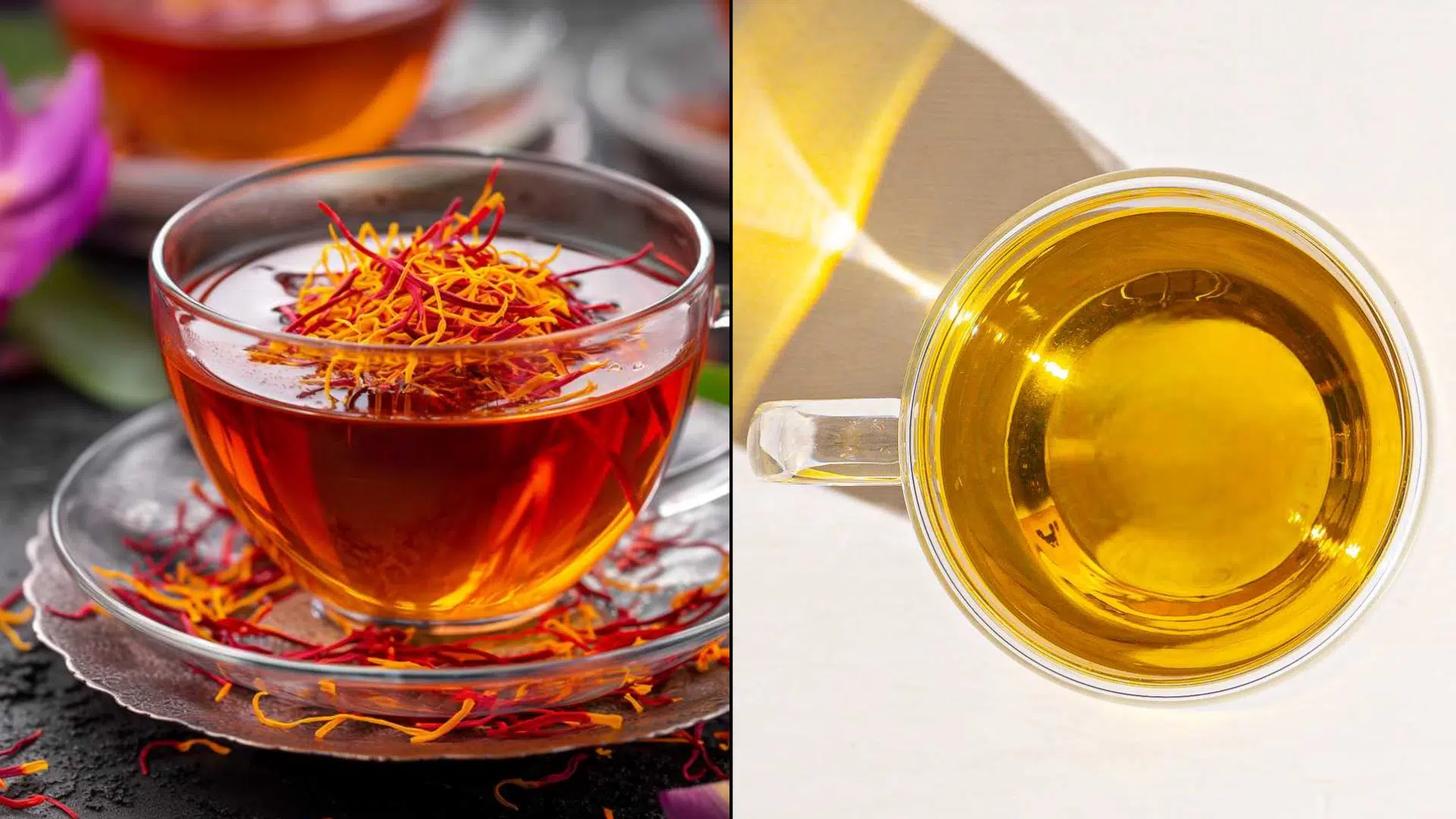Saffron tea has long been celebrated for its rich flavor and incredible health benefits.
If you’ve ever wondered how something as simple as a cup of tea could boost your mood, improve your sleep, and support your heart health, you’re in the right place.
In this blog, I’ll share many benefits of saffron tea, such as relieving PMS symptoms, boosting cognitive function, and aiding weight management.
If you’re seeking a natural remedy for stress or looking to improve overall health, saffron tea may be just the solution. Continue reading to find out how this golden spice can improve your daily routine and overall well-being.
Why Saffron Tea is Gaining Popularity
Saffron tea is becoming increasingly popular as people search for natural remedies that improve both physical and mental well-being.
With its rich history in traditional medicine, saffron is now making its way into modern health routines.
As interest in holistic and plant-based treatments grows, saffron tea is being recognized for its numerous health benefits, from mood improvement to antioxidant support.
The Benefits of Saffron Tea

Saffron tea offers a range of health benefits, including improved mood, relief from PMS symptoms, enhanced sleep, and support for heart health.
1. Mood Improvement
Saffron tea helps alleviate mild to moderate depression by boosting serotonin and dopamine levels, which are essential for emotional stability.
This natural mood enhancer can help improve overall well-being, making it a great choice for those feeling down, anxious, or stressed. By balancing neurotransmitters, saffron tea supports mental clarity and emotional resilience.
2. PMS Relief
Saffron tea is particularly effective in reducing PMS symptoms like irritability, mood swings, and cramps. Studies show that saffron helps balance hormones during menstruation, easing the discomfort associated with these symptoms.
Regular consumption may reduce the intensity and duration of PMS, providing natural relief for women dealing with these common issues.
3. Sleep Improvement
Saffron tea promotes relaxation and enhances sleep quality by increasing serotonin production, which plays a key role in regulating sleep cycles.
This makes saffron tea especially beneficial for those struggling with insomnia or restless nights. Its calming properties help you wind down, leading to deeper, more restorative sleep for overall well-being.
4. Antioxidant Protection
Saffron is rich in antioxidants like crocin and safranal, which protect the body from oxidative stress and free radical damage.
These potent compounds help slow down the aging process, support healthy skin, and may reduce the risk of chronic diseases such as cancer and heart disease. Regular consumption can provide long-term health benefits.
5. Heart Health
Regular consumption of saffron tea may contribute to better heart health by helping lower blood pressure, improve cholesterol levels, and protect against oxidative stress.
The antioxidants in saffron support healthy blood circulation and improve blood vessel function, making it a heart-friendly beverage that promotes overall cardiovascular health.
6. Cognitive Function
Saffron tea supports cognitive health by improving memory and protecting against neurodegenerative diseases like Alzheimer’s. The antioxidants in saffron help protect brain cells from oxidative damage, which can lead to cognitive decline.
Consuming saffron tea regularly may enhance mental clarity, improve learning ability, and reduce symptoms of depression, benefiting long-term brain health.
7. Weight Management
Saffron tea can help manage weight by curbing appetite and reducing cravings, making it easier to maintain a healthy diet.
Research suggests that saffron promotes satiety, assisting individuals to feel full longer, which may lead to a reduction in overall food intake. Including saffron tea as part of a balanced diet could assist with weight management goals.
8. Eye Health
Saffron contains compounds that may support eye health, particularly in preventing age-related macular degeneration (AMD).
Studies suggest that saffron’s antioxidant properties help protect retinal cells, which can improve vision and slow down the progression of eye diseases. Drinking saffron tea may be beneficial for maintaining good eye health as you age.
9. Digestive Health
Saffron tea aids in digestion by soothing the stomach and relieving discomfort such as bloating, indigestion, and nausea.
Its anti-inflammatory properties help calm the digestive tract, promoting better overall gut health. Saffron tea can be an excellent natural remedy for digestive issues and is a great addition to your daily routine.
10. Skin Health
Saffron’s anti-inflammatory and antioxidant properties are excellent for skin health. It helps brighten the skin, even out complexion, and reduce the appearance of fine lines and wrinkles.
Regular consumption of saffron tea or applying saffron-infused products can help fight pigmentation and support a glowing, youthful appearance.
11. Anti-Inflammatory Effects
Saffron possesses strong anti-inflammatory properties that can help reduce inflammation in the body. If dealing with chronic pain, arthritis, or injury, saffron’s anti-inflammatory compounds provide relief and promote faster healing.
Drinking saffron tea regularly may help alleviate discomfort and support overall physical recovery and well-being.
Antioxidant Properties and Health Benefits of Saffron Tea
Saffron tea is rich in antioxidants like crocin and safranal, which help protect against cell damage and promote overall health.
Antioxidants in Saffron Tea
Saffron tea is packed with powerful antioxidants like crocin and safranal, which fight oxidative stress and free radical damage.
These antioxidants play a crucial role in reducing inflammation and protecting the body’s organs, including the brain, heart, and skin.
Consistently drinking saffron tea may help slow down aging, improve overall health, and lower the risk of chronic diseases like cancer and heart disease.
Heart Health
Saffron tea is beneficial for heart health due to its ability to improve blood circulation and reduce the risk of cardiovascular diseases.
The antioxidants in saffron help lower blood pressure and cholesterol, promoting heart health.
Regular consumption of saffron tea may improve blood vessel function, prevent plaque buildup in arteries, and contribute to better overall cardiovascular health.
Cognitive Function
Saffron tea supports cognitive health by protecting brain cells from oxidative damage. The antioxidants in saffron help enhance memory and cognitive function.
Research has shown that saffron may play a role in reducing cognitive decline, such as preventing Alzheimer’s disease.
Drinking saffron tea may help boost mental clarity and support long-term brain health by protecting against age-related brain damage.
How to Use Saffron in Tea

Follow these simple steps to brew a perfect cup of saffron tea and enjoy its full health benefits:
Step 1: Select pure saffron threads for maximum flavor and health benefits. Look for bright red strands and avoid saffron that appears yellow or pale. Quality saffron improves the taste and potency of your tea.
Step 2: Bring water to 200°F (93°C), just below the boiling point. This helps to release saffron’s full flavor and health properties without burning or degrading the spice. Use fresh, filtered water for the best taste.
Step 3: Add 3-4 saffron threads to your hot water. Adjust the amount based on how strong you prefer the flavor and the health benefits you want to derive from the saffron.
Step 4: Let the saffron steep for 5-8 minutes. This allows the threads to release their rich color, flavor, and beneficial compounds into the water, enhancing the tea’s potency.
Step 5: Add optional ingredients like cardamom, ginger, milk (or coconut milk), or sweeteners like honey for extra flavor. These additions complement saffron’s benefits and make the tea more enjoyable.
Step 6: Strain the saffron threads out of your tea or leave them in for a stronger flavor. Serve the tea hot or cold, depending on your preference. Enjoy your saffron tea and its health benefits.
Saffron Tea Benefits for Different Lifestyles
Saffron tea offers a variety of benefits tailored to different age groups and health goals. Here’s how it can support your well-being:
1. For Seniors
Saffron can support cognitive function and heart health in older adults. The antioxidants in saffron, such as crocin and safranal, protect brain cells from oxidative damage, potentially reducing the risk of cognitive decline and memory loss.
Additionally, saffron’s ability to lower blood pressure and improve cholesterol levels contributes to better cardiovascular health, making it an ideal addition to a senior’s diet.
2. For Women
Saffron tea is particularly beneficial for women, especially when dealing with PMS symptoms like irritability, mood swings, and cramps. Research shows that saffron can help regulate hormonal imbalances and ease these discomforts.
Its mood-improving properties also promote emotional well-being, providing natural relief from stress and anxiety. Drinking saffron tea regularly can help balance emotions and improve overall health during menstruation.
3. For Men
Saffron provides numerous benefits for men, particularly for heart health, mood improvement, and cognitive function. The antioxidants in saffron support a healthy heart by improving circulation and reducing inflammation.
Additionally, saffron can help improve mood by boosting serotonin levels, while also enhancing cognitive function and memory. It’s an excellent option for those looking to support their mental and physical health.
4. For Weight Loss
Saffron may aid in weight loss by helping to control appetite and reduce cravings. Studies suggest that saffron’s appetite-suppressing qualities can promote satiety, making it easier to stick to a healthy, balanced diet.
By incorporating saffron tea into your routine, you can feel fuller for longer and avoid overeating, contributing to your weight management goals.
5. For Anxiety and Sleep
Saffron tea can be a natural remedy for anxiety and sleep problems. Mixing saffron with calming ingredients like chamomile or lavender improves its soothing effects, making it an excellent choice for relaxation.
Drinking saffron tea before bedtime may help reduce stress, calm the mind, and improve sleep quality, allowing you to enjoy a peaceful night’s rest.
Other Uses of Saffron Beyond Tea
Saffron is a versatile ingredient with benefits that extend beyond tea, including its use in skincare, cooking, and as a supplement.
Skincare
Saffron is known for its anti-aging and brightening effects, making it a popular ingredient in skincare products.
The antioxidants in saffron help to protect skin cells from oxidative stress, reducing signs of aging like wrinkles and fine lines. It also promotes an even skin tone and can reduce pigmentation, making it a natural option for achieving a radiant complexion.
Cooking
Saffron adds a unique flavor and vibrant color to meals, enhancing the sensory experience. Its antioxidant properties make it a healthy addition to dishes like risotto, soups, and desserts.
Saffron is rich in compounds like crocin and safranal, which not only boost the taste but also provide anti-inflammatory benefits. It’s widely used in Mediterranean, Middle Eastern, and Indian cuisines.
Supplements
Saffron is available in capsule or powder form, offering a convenient way to enjoy its health benefits. These supplements provide an easy, measured dose of saffron’s powerful antioxidants and mood-improving compounds.
Saffron supplements may support mental clarity, emotional well-being, and overall health, providing an effective alternative for those who want the benefits of saffron without brewing tea.
Comparisons with Other Herbal Teas
Saffron tea offers unique health benefits, including mood Improvement and cognitive support, setting it apart from other herbal teas.
Saffron vs. Chamomile Tea

Saffron tea’s mood-improving properties can uplift your spirits, while chamomile tea is primarily known for its calming and sleep-inducing effects.
Both teas are beneficial for relaxation, but saffron provides additional benefits for emotional well-being, making it a great choice for those looking to improve both mood and sleep.
Chamomile, on the other hand, is gentle and ideal for reducing stress before bedtime, without offering the cognitive support that saffron does.
Saffron vs. Ginger Tea

Both saffron and ginger tea offer digestive benefits, helping with bloating, nausea, and indigestion. However, saffron tea stands out by also enhancing mood and supporting cognitive function.
Ginger tea focuses more on digestion, reducing inflammation in the gut, and providing a natural energy boost.
Saffron, with its powerful antioxidants, not only helps with digestion but also supports mental clarity, memory, and mood improvement, making it a more comprehensive choice for overall health.
Saffron vs. Turmeric Tea

Saffron and turmeric both possess potent anti-inflammatory properties, but saffron offers the added benefits of improving cognitive function and mood.
While turmeric is widely known for its anti-inflammatory effects on joint health, saffron tea can help improve mental health by improving serotonin levels and protecting brain cells.
Saffron’s unique blend of mood-boosting and cognitive benefits makes it stand out from turmeric, which is more focused on physical inflammation.
Potential Side Effects and Considerations
While saffron tea offers numerous health benefits, it may not be suitable for everyone. Here are some important considerations to keep in mind:
Who Should Avoid Saffron Tea
- Pregnancy: Saffron can stimulate contractions, so it’s best to avoid it during pregnancy.
- Breastfeeding: There’s limited research on the safety of saffron during breastfeeding, so caution is advised.
- Allergies: People with a known allergy to saffron should avoid consuming it.
- Medication Interactions: Saffron may interact with blood thinners, antidepressants, and other medications, so consult your healthcare provider.
Possible Side Effects
- Dizziness: Some people may experience light-headedness or dizziness, particularly with high doses.
- Stomach Upset: Saffron can cause mild digestive issues, including stomach discomfort or nausea, in sensitive individuals.
- Consult a Healthcare Provider: Always speak with your doctor before adding saffron tea to your routine, especially if you have underlying health conditions.
Enjoying saffron tea in moderation is generally safe, but being aware of these precautions ensures you get its benefits without unwanted effects.
Wrapping Up
Saffron tea benefits cover a wide range of health improvements that can significantly enhance your well-being.
If you’re looking to improve your mood, ease PMS symptoms, get better sleep, or support heart health, saffron tea provides a natural and enjoyable way to do so.
With its rich antioxidant properties and positive effects on both the body and mind, it’s a perfect addition to your daily routine.
Now that you know the powerful saffron tea benefits, why not give it a try? Check out my other blog posts for more tips on living a healthy, balanced life.



















